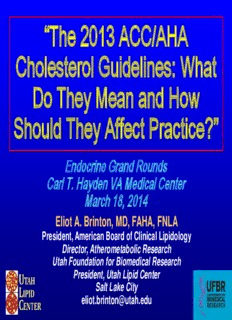
The 2013 ACC/AHA Cholesterol Guidelines PDF
Preview The 2013 ACC/AHA Cholesterol Guidelines
“The 2013 ACC/AHA Cholesterol Guidelines: What Do They Mean and How Should They Affect Practice?” Endocrine Grand Rounds Carl T. Hayden VA Medical Center March 18, 2014 Eliot A. Brinton, MD, FAHA, FNLA President, American Board of Clinical Lipidology Director, Atherometabolic Research Utah Foundation for Biomedical Research President, Utah Lipid Center Salt Lake City [email protected] Speaker Disclosures Dr. Brinton has received: • Research funding: Amarin, Health Diagnostic Laboratory, Merck, Roche; Aurora Foundation; NIH • Honoraria as consultant/advisor: Aegerion, Amarin, Arisaph, AstraZeneca, Atherotech, Daiichi-Sankyo, Essentialis, Genzyme, Janssen, Kowa, Merck, Novartis, Regeneron, Sanofi-Aventis, Takeda • Honoraria as speaker: Amarin, Daiichi-Sankyo, Janssen, Kowa, Merck, Takeda Learning Objectives Listeners should be able to: 1. Appreciate the scientific basis of the 2013 ACC/AHA Cholesterol Guidelines (AACG)- including both strengths and limitations 2. Learn the major elements of the AACG approach to cholesterol treatment 3. Discuss the pros and cons of LDL-C and Non-HDL-C targets or goals 4. Understand how a hybrid between the AACG and other past and present guidelines might be beneficial and how to implement What the 2013 ACC/AHA Cholesterol Guidelines ARE 2013 ACC/AHA Cholesterol Guidelines: Summary 1) Heart healthy lifestyle habits are the foundation to CVD prevention 2) Assess 10-year CVD risk every 4-6 years in adults 40-75 y/o and w/o CVD, DM, not yet on lipid therapy and w/ LDL 70-189 mg/dl 3) Recommend high-intensity statin in those with CVD and age <75 years (statin categ 1) Stone NJ et al. Circulation. 2013. doi:10.1161/01.cir.0000437738.63853.7a. 2013 ACC/AHA Cholesterol Guidelines: Summary (cont.) 4) Recommend high-intensity statin in those with LDL-C >190 mg/dl (statin categ 2) 5) Recommend moderate- or high- intensity statin for DM-1 or DM-2 aged 40-75 (statin categ 3) 6) Recommend moderate- to high-intensity statin for 40-75 y/o with >7.5% 10-year CVD risk (statin categ 4) Stone NJ et al. Circulation. 2013. doi:10.1161/01.cir.0000437738.63853.7a. 2013 ACC/AHA Cholesterol Guidelines: Main Algorithm (part 1) 1 2 Stone NJ et al. Circulation. 2013. doi:10.1161/01.cir.0000437738.63853.7a. 2013 3 ACC/AHA Cholesterol Guidelines: Main Algorithm (part 2) 4 Stone NJ et al. Circulation. 2013. doi:10.1161/01.cir.000 0437738.63853.7a. Approximate Dose-Equivalency of Statin LDL-C Efficacy ----------------------dose of agent (mg/d)-------------------- Rosuva* Atorva* Simva Pitava Lova Prava Fluva Approx ↓LDL-C 10 1 20 40** 40 28-34% 5 10** 20** 2** 40** 80 80** 35-42% 10** 20 40 4 80 39-47% 20 40 46-52% 40 80 51-55% *Atorva and rosuva may be more effective (½ and 1 doubling respectively). **Most commonly used dose in US. Adapted from: Roberts WC. Am J Cardiol. 1997;80:106-107. Stein E et al. J Cardiovasc Pharmacol Therapeut. 1997;2:7-16. Rosuvastatin PI, Pitavastatin PI. Approximate Dose-Equivalency of Statin LDL-C Efficacy ----------------------dose of agent (mg/d)-------------------- Rosuva* Atorva* Simva Pitava Lova Prava Fluva Approx ↓LDL-C Moderate-intensity 10 1 20 40** 40 28-34% 5 10** 20** 2** 40** 80 80** 35-42% 10** 20 40 4 80 39-47% 20 40 46-52% 40 80 51-55% *Atorva and rosuva may be more effective (½ and 1 doubling respectively). **Most commonly used dose in US. High-intensity Adapted from: Roberts WC. Am J Cardiol. 1997;80:106-107. Stein E et al. J Cardiovasc Pharmacol Therapeut. 1997;2:7-16. Rosuvastatin PI, Pitavastatin PI.
Description: